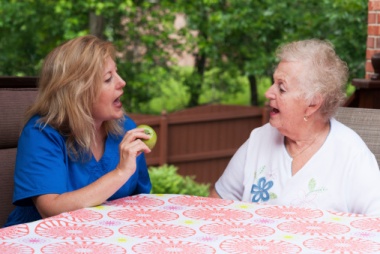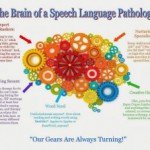 Over the years I have learned that no matter where you practice, there is a need to collaborate, educate, and be educated by and with other professionals in the field of speech therapy.
Over the years I have learned that no matter where you practice, there is a need to collaborate, educate, and be educated by and with other professionals in the field of speech therapy.
At first, this came as a surprise to me. I mistakenly thought my coworkers generally knew what speech therapists do. I have found that a lack of knowledge is often an obstacle to job performance and can hinder a patient’s progress.
For example, when working in the schools, I found that some of the teachers were resistant to having students pulled out for speech or having a therapist work in their classroom. Teachers have stressful jobs and can view pulling students out of class for speech therapy as detrimental to their education and/or interfering with their job.
Another example is that in a skilled nursing setting, CNAs may be resistant to learning how to safely feed the residents. A CNA needs to get a certain number of patients fed in 45 minutes and want to do their job as quickly and effectively as possible. Yet, they often don’t realize that speech therapists work with patients to improve their swallowing and don’t realize that our job is important to the resident’s well being too.
The next time you find yourself butting-heads with a coworker, here are some tips on collaborating with those outside of the speech therapy field:
- Watch how speech therapy is used in your setting
- Ask coworkers how you can best help them with a shared patient
- See if your coworkers are open to working with you and/or observing what you do
- See if you can observe what they do with patients. Even if they can only spare fifteen minutes, this can be invaluable
- See if your setting and coworkers are open to in-services
- Be open too
Some examples of how this might work would be:
- After observing a child in their classroom, collaborate with the teacher and aides on helping that child follow directions and answer questions
- Demonstrate strategies on how to cue a child to answer questions
- Educate CNAs about how the swallow mechanism works and the need to make sure that a resident has an empty mouth before the next bite
- Demonstrate how to feed a patient
The list can go on and on but the main takeaway is that it’s important to be open to collaboration and education. When we do, we all win (especially our patients!).
>About the Author
Sandra Alexander has over 20 years of experience in the speech therapy field. In 1994, she received her Master’s Degree in Communicative Disorders from San Diego State University and in 1985 she received a B.A. in Communicative Disorders from the University of Redlands. She is also a returned Peace Corps Volunteer who taught speech therapy in Ecuador from 1987-1989.







